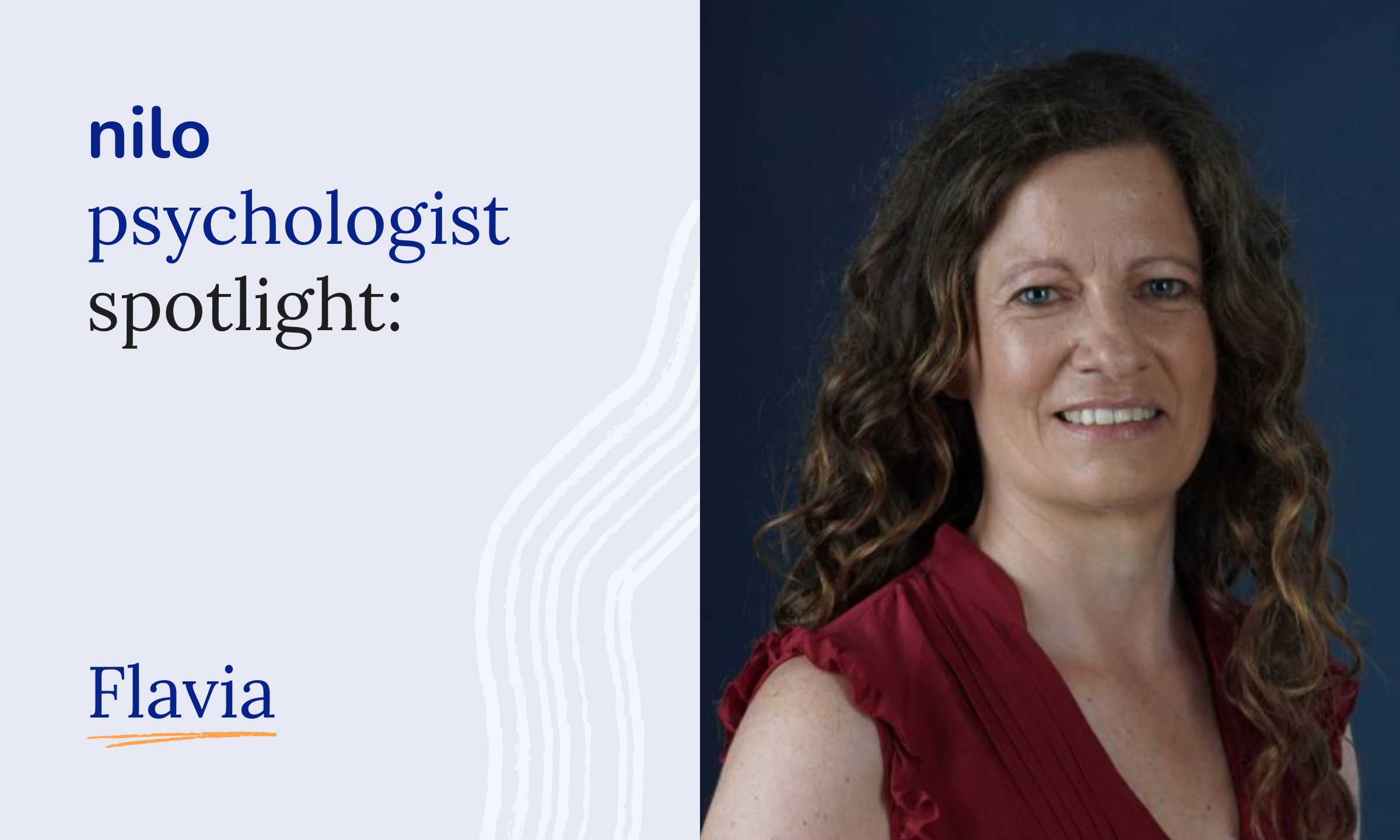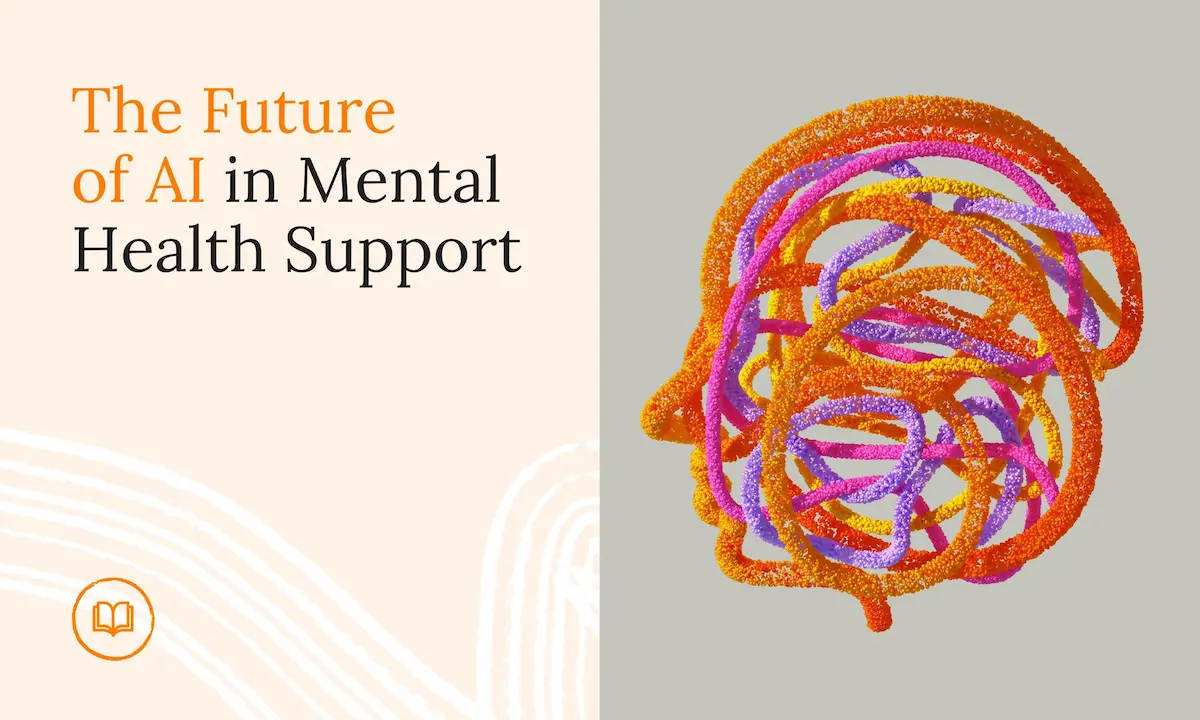A global team of leading psychologists makes up the heart of nilo.health’s platform, offering personalized, dedicated 1-to-1 counseling for every user. In our new series, we’re introducing them to you! Read on to discover more about nilo psychologist Flavia, her experience working holistically with companies and employees, and the four steps leaders can take to build a strong, mentally healthy workplace.

Could you please introduce yourself?
I am a clinical psychologist, integrative psychotherapist, and life coach. Over the past 25 years, I’ve been supporting clients (in individual, couple, family, and group sessions) dealing with anxiety, panic attacks, grief, stress, expats and third-culture kids facing new challenges as well as coachees eager to identify and move towards the realization of their vision. I embrace a pluralistic integrated model, applying evidence-based theories and methodologies to co-create a personalized path with each new client.
What I find most exciting about my work is guiding clients to uncover their uniqueness and unlock their potential to make their dreams and goals come true.
In addition to my private practice, I’ve served as a lecturer in various graduate programs, a trainer and coach in international companies (Nokia, Mercedes-Benz, Ferrero, etc.), a supervisor in psychiatric units and a multicultural counselor in refugee camps and ethnopsychiatry units. I’ve provided assistance to younger clients, immigrants and students as a high-school and university counselor, and conducted psychological assessments of children as a paediatric psychologist. I’ve authored and co-authored 9 books on applied psychology topics.
What I find most exciting about my work is guiding clients to uncover their uniqueness and unlock their potential to make their dreams and goals come true. Witnessing their happiness and pride as they overcome courageous challenges, achieve their aspirations, sometimes after many painful struggles, is really touching. Mindfulness embraces my work and my private life, enabling me to nurture deep listening, respect, acceptance and kindness.
Where are you based, and which languages do you speak?
I am currently living in Lithuania, and I am fluent in Italian (my mother tongue), German, English and on the way to improve my French.
How does the stigma around mental health in the workplace affect employees?
Often there’s a fear of expressing one’s emotional discomfort, the pain one is experiencing, or the daily struggles in trying to find a healthier and more effective balance between personal and professional life. Among the main reasons for this concern, I would list the worries of facing repercussions at the workplace, being negatively evaluated, the sense of shame, and feeling problematic. This is also because often there’s still a lack of awareness about how stress, anxiety, or insecurity are much more common than many think.
What can be done to reduce this stigma?
One initial step involves implementing Mental Health Promotion Programs tailored for individual employees, such as counseling sessions, as well as for the teams, including training sessions and groups focused on topics like work-life balance, stress and anxiety reduction, and transitions management. For instance, through my experience with nilo, I’ve witnessed clients sharing how their colleagues’ positive experiences with these initiatives have inspired them to participate as well, giving them the courage to take the crucial first step, without feeling “ashamed, different or wrong” that often is associated with seeking help.
Finding suitable support can prove arduous… However, if the company provides this support, many obstacles can be bypassed.
In your opinion, how can integrating mental health support at work help an individual?
Most of the employees I have encountered struggle to find a satisfactory work-life balance, experience stress, and some have even reached the point of burnout. Doubts about occupying the right professional role and questioning goals and aspirations are frequent. Nevertheless, finding suitable support can prove arduous: determining the type of assistance required, whether it be counseling, coaching, or psychotherapy, poses a challenge and waiting lists can be considerably lengthy. Furthermore, locating a professional who communicates in the same language, or at least in English, can be a general difficulty. However, if the company provides this support, many of these obstacles can be bypassed. Employees are much likelier to take a first step and seek help, improving their psychological well-being and in some cases preventing risky situations from escalating.
And how can integrating mental health support at work help the larger company?
It’s challenging to detach this question from the previous one as they are inherently interconnected. If each individual employee can enhance their emotional well-being, the company will also reap the benefits. This translates to improved productivity, increased employee satisfaction, and overall organizational success. Frequently, I’ve observed that employees, thanks to mental health support, experience a heightened sense of gratitude towards the company. They feel cared for and nurtured, fostering a stronger sense of belonging and as a natural ripple effect, they feel proud in being integral to the company.
He expressed gratitude to nilo and his company for providing this transformative opportunity.
Could you tell us about a particular time (keeping it anonymous, of course!) that you’ve really seen your work with nilo help someone?
Returning to the obstacles I have mentioned before, I had a client in his fifties had never sought support despite lifelong struggles since childhood. As an expat, finding assistance in his native language within the public health system proved challenging. However, influenced by his company’s offering and colleagues’ positive experiences with nilo sessions, he decided to give it a chance.
Initially seeking advice about his adolescent son, he gradually began using the space for self-discovery, and driven by his strong motivation he started immediately putting into practice every new tool and skill he acquired. As he opened up, he recognized for the first time the impact of his past on his present. This included his professional life, helping him understand, for example, why he always avoided giving presentations and sharing his thoughts and knowledge – all aspects that were detrimental to his career.
During our final session, he expressed feeling more secure both personally and professionally: he rekindled his motivation and hope, became better at recognizing his strengths and abilities, and became more capable of stepping out of the shadow and taking more risks. His fatherhood improved, deepening his bond with his son. With a newfound positive and hopeful outlook, he approached his present and future with renewed optimism. He expressed gratitude to nilo and his company for providing this transformative opportunity.
What tips would you offer managers or leaders in a company to keep a healthy work environment that protects everyone’s mental health?
Creating a nurturing work environment that safeguards everyone’s mental well-being requires a delicate balance, especially considering the complexities of each company and team, and providing guidance to someone already skilled in their intricate and challenging role is not easy. Hence, in response to this question, I aim to draw insights from employees, where the necessity to invest simultaneously in these four key areas becomes evident: the work environment, the team, the individual employee, and leadership.
Firstly, embracing an inclusive, empathetic, and diverse culture, where each individual feels valued, sets the foundation. Transparent communication and mutual reliance between colleagues and leaders play a pivotal role in cultivating collaboration, innovation, and a sense of belonging within the organization.
Recognizing and celebrating employees’ accomplishments should never be underestimated.
Supporting the staff’s mental health involves equipping them with effective tools. This can be achieved through specialized training, interactive workshops, and even avenues like art therapy, focusing on stress management, conflict resolution, and team building. Prioritizing work-life harmony by offering flexible arrangements, wellness initiatives, and encouraging regular breaks is another important step. It’s equally crucial to address workload concerns to prevent burnout.
Recognizing and celebrating employees’ accomplishments should never be underestimated. Clear pathways for career advancement and skill development are essential for their engagement and satisfaction. In setting expectations, defining roles and responsibilities explicitly while ensuring manageable workloads is vital. Private counseling spaces can provide much-needed support.
Lastly, leaders play a pivotal role in modeling these practices. Balancing work and personal life, taking regular breaks, and fostering a positive mindset demonstrate commitment. Cultivating a healthy work environment is a perpetual endeavor. Regularly evaluating the outcomes of the efforts, adjusting as needed, and persistently valuing the well-being of the team members are central.
It’s important to acknowledge that implementing these strategies is indeed more complex and difficult than outlining them!
Best of luck and continued success on this journey!
Want to find out more about Flavia, and how she and her colleagues can lead your company to success? Get in touch now!







